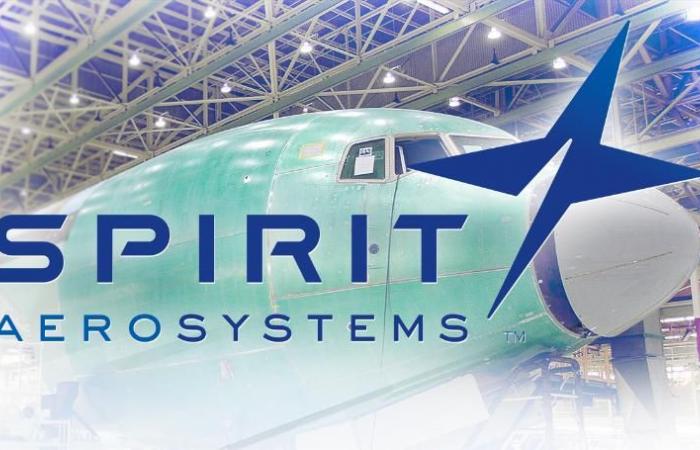Twenty years after separating from it, Boeing will buy its subcontractor Spirit AeroSystems, overwhelmed by production problems, but part of the activities will be taken over by Airbus, announced Monday the two major competitors in the global aeronautics industry. For Boeing, the transaction will be done entirely in shares, at a price of 37.25 dollars per share, valuing Spirit AeroSystems at 4.7 billion dollars. Including Spirit’s debt, the operation is valued at 8.3 billion, explained the American manufacturer in a press release.
Boeing is by far Spirit’s largest customer, with 60% of its revenue coming from the aircraft manufacturer in 2022, including fuselages. But the equipment manufacturer is also a strategic supplier to Airbus, for which it produces wing components in particular. In a statement Monday, the European aircraft manufacturer said it had “entered into a binding agreement with Spirit AeroSystems for the potential acquisition of major Airbus-related activities.”
“We believe this agreement is in the best interests of travelers, our customers, Spirit and Boeing employees, our shareholders and our country more generally,” Boeing CEO Dave Calhoun said in a company statement.
Boeing and Spirit AeroSystems had confirmed preliminary discussions for the merger in early March. Spirit AeroSystems was formed from several of its businesses that were merged into an independent company. Spirit AeroSystems and Boeing have been under scrutiny since a door on the fuselage of an Alaska Airlines Boeing 737 MAX 9 came loose in mid-flight on January 5.
Turbulence
On March 4, the US Federal Aviation Administration (FAA) said that “non-conformance issues in the manufacturing control process, handling and storage of spare parts, and production control” had been identified at Boeing and Spirit AeroSystems. Three of the four families of commercial aircraft currently manufactured by Boeing are the subject of FAA investigations for quality issues: the 737, the 777 and the 787 Dreamliner. The proposed acquisition by Airbus, subject to a due diligence process by the troubled equipment manufacturer, would involve “major Airbus-related activities,” according to the European group. It would notably concern the production of fuselage sections of the A350 located in Kinston (North Carolina) and Saint-Nazaire (France), wings and the central fuselage of the A220 in Belfast (Northern Ireland) and Casablanca, as well as pylons of the A220 in Wichita (Kansas).
“With this agreement, Airbus intends to ensure the stability of the supply of its commercial aircraft programs through a more sustainable evolution, both operationally and financially, of the various Airbus work packages for which Spirit AeroSystems is currently responsible.” Having embarked on an outsourcing policy to retain only the final assembly of aircraft, Boeing separated in 2005 from its Wichita (Kansas) plant, specializing in aerostructures, giving birth to Spirit AeroSystems.
The company has since diversified its customers and grown through acquisitions. But its difficulties led Boeing to announce in early March that it was considering reintegrating Spirit. It was unthinkable for Airbus that its main competitor would become one of its strategic suppliers. Airbus CEO Guillaume Faury had thus confided in late April that he was monitoring the situation “closely”. “We do not want large work packages to be supplied by our main and only competitor,” he stressed.
A major supplier for commercial aircraft
Of Spirit AeroSystems’ $6.05 billion in revenue in 2023, 70% came from Boeing, about 23% from its European competitor Airbus, and the remainder from other customers (Lockheed Martin, Northrop Grumman, Bombardier, Rolls-Royce), including the U.S. government for military equipment. The company, which posted a net loss of $616 million in 2023, is organized into three divisions: Commercial (4.88 billion in revenue), Defense and Space (789 million), and Aftermarket (maintenance, spare parts, services, etc.: $374 million).
By the end of 2023, its order book had reached nearly $50 billion, 55% of which was related to Boeing’s 737 and about 11% to Airbus’ A320. Spirit AeroSystems was founded in 2005, when Boeing decided to consolidate its operations in Wichita (its headquarters, Kansas), Tulsa and McAlester, Oklahoma, into an independent company.
Thanks to the acquisition of BAE Aerostructures in April 2006, the company is recovering contracts with Airbus that will increase further after the acquisition in October 2020 of assets of the aircraft manufacturer Bombardier in Northern Ireland and Morocco. “We are currently the sole supplier of almost all the products that we sell to Boeing and Airbus,” the group states in its latest annual report. It manufactures in particular fuselages for Boeing’s 737 and structures for its 787 Dreamliner, as well as elements for its two other commercial aircraft (767 and 777).
Spirit Aerosystems is also a major supplier of wing components for the Airbus A320 family and A220, and also makes parts for the A330 and A350. At the end of 2023, it produced at eleven sites: six in the United States, two in the United Kingdom, and one each in Malaysia, France and Morocco. Pat Shanahan, who worked for more than thirty years at Boeing and was acting Secretary of Defense in 2019, joined its board in 2021 and took over in September 2023 to try to address production and quality control issues. Listed on the New York Stock Exchange (NYSE), the company employed 20,655 people at the end of 2023, including 14,780 in the United States (12,590 in Wichita).
Sami Nemli With Agency / Les Inspirations ÉCO






